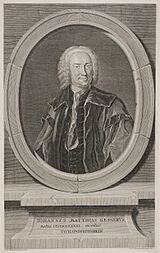Johann Matthias Gesner facts for kids
Johann Matthias Gesner (born April 9, 1691 – died August 3, 1761) was an important German scholar and teacher. He was known for studying classical languages like Latin and Greek, and for improving schools.
Contents
His Early Life and Education
Johann Matthias Gesner was born in a town called Roth an der Rednitz, near Ansbach, Germany. His father, Johann Samuel Gesner, was a pastor (a religious leader) and passed away in 1704. This left his family in a difficult financial situation. His mother, Maria Magdalena, later remarried. Her new husband, Johann Zuckermantel, was very supportive of young Johann.
Mr. Zuckermantel noticed how smart Johann was. He helped him prepare for the Ansbach Gymnasium, which was a type of high school. The school was expensive, so Johann received help from public funds and lived in a special home for students who needed support.
The head of the Gymnasium, Georg Nikolaus Köhler, paid special attention to Johann. He helped Johann become very interested in languages. Mr. Köhler even lent him Greek books and gave him special exercises. Johann had to put together broken pieces of text to make them make sense. Gesner later said that his years at the Gymnasium were the happiest of his life.
He then went to the University of Jena to study different subjects. These included metaphysics (the study of basic truths), Semitic languages (like Hebrew and Arabic), and classical literature. He studied as a theology student, meaning he was learning about religion. He worked with a professor named Johann Franz Buddeus, who became his friend. Professor Buddeus even let Gesner live in his house.
Even with this support, Gesner did not get a teaching job at Jena. In 1714, he published a book about a work called Philopatiis, which was thought to be written by Lucian.
His Career and Achievements
In 1715, Gesner became a librarian and a vice-principal in Weimar. There, he became good friends with the famous composer Johann Sebastian Bach. Bach even dedicated one of his musical pieces, Canon a 2 perpetuus BWV 1075, to Gesner.
After being dismissed from his librarian job in Weimar, Gesner became the head teacher (rector) of the Gymnasium in Ansbach in 1729. In 1730, he became the rector of the Thomasschule in Leipzig. However, the professors at the University of Leipzig did not allow him to teach there.
Later, at the University of Göttingen, he became a Professor of Poetry and Eloquence in 1734. He also became a librarian there. He continued to publish books about classical languages and literature. He also wrote Latin poems and helped promote the university. In 1738, he started the Deutsche Gesellschaft (German Society). This group worked to improve German literature. He likely got the idea from a similar group in Leipzig.
Gesner passed away in Göttingen.
His Influence and Legacy
Baumgarten, a philosopher, quoted many passages from famous writers like Horace, Virgil, Catullus, Juvenalis, and Cicero in his book Aesthetics (1750). According to Lessing, many of these quotes came from Gesner’s own book. This book was called Novus Linguae et Eruditionis Romanae Thesaurus (which means 'New Thesaurus of the Roman Language and Learning'), published in 1747.
Johann Matthias Gesner became very famous as a reformer, a scholar, and a humanist. A reformer is someone who works to improve things. A scholar is someone who studies a lot. A humanist is someone who believes in the value of human beings and their achievements.
Main Works
- An updated version of Basilius Faber's Thesaurus eruditionis scholasticae (1726). He later continued this work under a new title, Novus linguae et eruditionis Romanae thesaurus (1749). This was like a big dictionary or encyclopedia of Latin words and knowledge.
- Opuscula minora varii argumenti (1743—1745) – a collection of his smaller writings on different topics.
- Index etymologicus latinitatis (1749) – a book about the origins of Latin words.
- Primæ lineæ isagoges in eruditionem universalem (1756) – an introduction to universal knowledge.
- Thesaurus epistolicus Gesnerianus (edited by Klotz, 1768—1770) – a collection of Gesner's letters.
- He also edited and published works by other classical authors. These included the Scriptores rei rusticae (writers on farming), Quintilian, Claudian, Pliny the Younger, Horace, and the Orphic poems. Some of these were published after his death.
See also
 In Spanish: Johann Matthias Gesner para niños
In Spanish: Johann Matthias Gesner para niños
 | Charles R. Drew |
 | Benjamin Banneker |
 | Jane C. Wright |
 | Roger Arliner Young |


